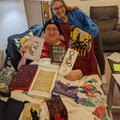Lavender Ribbon Cancer Scholarship
This scholarship honors two beloved late spouses who lost their lives way too soon to cancer. Sylvie Venne was a loving mother and wife, and Ralph Zimmer was a devoted father and husband. Their loss left a now blended family devastated. Sylvie and Ralph worked tirelessly in the service of others for their entire professional careers, Sylvie as a hospitality manager in the hotel and tourism industry, and Ralph as a law enforcement officer and leader in public safety.
They both dedicated their lives to helping others before becoming ill with cancer, using their days to make a difference in their communities and in the greater world. Cancer cuts many lives short, ripping holes in families and depriving society of the generosity and passion of those who become ill.
This scholarship seeks to honor the impactful legacies of Sylvie and Ralph by supporting students who share their dedication to service.
Any undergraduate student in Maryland or Virginia who has lost a parent, guardian or caregiver to cancer may apply for this scholarship opportunity if they have at least a 3.2 GPA and are pursuing a service-oriented career, but applicants entering hospitality or public safety professions are preferred. U.S. citizens are preferred.
To apply, tell us about your experience with cancer, how it has impacted your family, and what your goals are. Additionally, upload a photo of you and a loved one who you’ve lost.
Tell us how cancer has impacted your family and your goals to pursue a service career to help others.
Winners and Finalists
January 2026
January 2025
Winning Application




Explore All Kinds of Scholarships for All Kinds of Students
FAQ
The application deadline is Dec 15, 2025. Winners will be announced on Jan 15, 2026.
Your privacy is a top priority on the Bold.org platform, and you can find our privacy policy in full here. You may opt out of communications from Bold.org at any time, and unless we’ve first notified you and gotten your consent, you’ll never receive communication from any third parties related to personal information you give us.
Award amounts per winner are designated by the donor. Check the award amount for a detailed breakdown.
The winner will be publicly announced on Jan 15, 2026. Prior to the announcement date, we may contact finalists with additional questions about their application. We will work with donors to review all applications according to the scholarship criteria. Winners will be chosen based on the merit of their application.
Award checks will be sent to the financial aid office of the winner's academic institution in their name to be applied to their tuition, and in the name of their institution (depending on the school's requirements). If the award is for a qualified educational non-tuition expense, we will work with the winner directly to distribute the award and make sure it goes towards qualified expenses.
Before we award the scholarship, the winner will be required to confirm their academic enrollment status. Depending on the circumstances, verification of Student ID and/or their most recent transcript will be required.
If you have any questions about this scholarship or the Bold.org platform, just email contact@bold.org and we’ll get back to you as quickly as we can.
Yes. The terms and conditions for this scholarship can be found here.